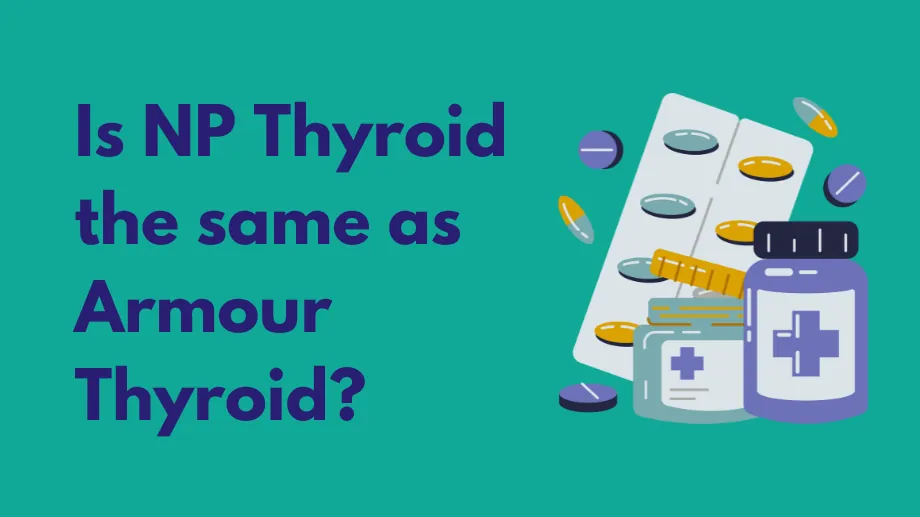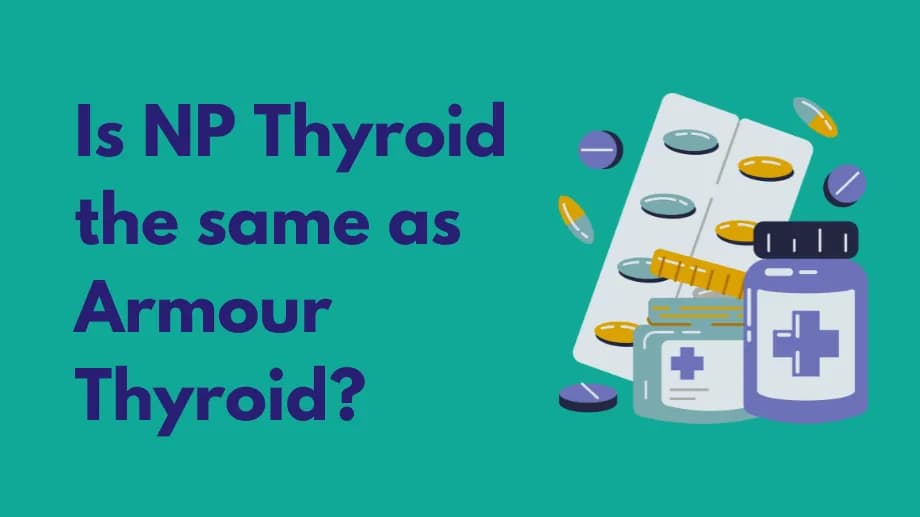Is NP Thyroid the same as Armour Thyroid?

NP Thyroid and Armour Thyroid are two different brand names for natural thyroid hormone replacement medications. They both contain desiccated thyroid extract (DTE) made by grinding dried thyroid glands from pigs (porcine) and are a combination of two thyroid hormones, triiodothyronine (T3 liothyronine) and tetraiodothyronine (T4 levothyroxine). Although they are not approved by the U.S. Food and Drug Administration (FDA), NP Thyroid and Armour Thyroid are both used to treat thyroid disorders, including an underactive thyroid (low thyroid hormone levels) and Hashimoto’s disease. Since they have the same active ingredient, they typically have the same side effects, drug interactions, and warnings. Keep reading as we go into more detail so you can have a better understanding of these medications.
What are NP Thyroid and Armour Thyroid used for?
Both of these are natural desiccated thyroid medications and are made from animal thyroid glands, specifically pig’s. They are used in the treatment of hypothyroidism, a condition where your thyroid gland does not produce enough thyroid hormone. It is also used to decrease thyroid-stimulating hormone (TSH) levels in people with thyroid goiters, nodules, or thyroid cancer.
Who makes NP Thyroid and Armour Thyroid?
NP Thyroid is manufactured by Acella Pharmaceuticals. Armour Thyroid is manufactured by Allergan Pharmaceuticals.
What are the side effects of NP Thyroid and Armour Thyroid?
Some people may experience mild to serious side effects while taking thyroid hormone replacement therapy. This is usually because your thyroid levels are too high (hyperthyroidism). Your provider will order blood tests to check your thyroid function and hormone levels.
- Increased heart rate
- Rapid pulse or heart palpitations
- Chest pain
- Tremors
- Hair loss
- Muscle weakness
- Excessive sweating
- Weight loss
- Anxiety or nervousness
- Diarrhea or increased bowel movements
Typically, these side effects are only temporary and are easy to manage. If you experience any of these side effects, talk with your healthcare provider. Don’t stop taking this medication unless they recommend it.
Some serious side effects that rarely occur include:
- Increased risk of serious heart issues. This is more common in older adults and those with heart disease, irregular heartbeat, high blood pressure, or coronary artery disease.
- Very low stress hormone levels. Symptoms include constant fatigue, muscle weakness, loss of appetite, dizziness, or stomach pain.
- Higher blood sugar levels. You may need to have the dose of your diabetes meds adjusted. Let your healthcare provider know if you notice any blood sugar levels that are higher than normal.
- Serious, life-threatening allergic reaction. Symptoms include hives, swelling of your face, tongue, or throat, and shortness of breath.
Disclaimer: This is not the entire list of possible side effects. Contact your healthcare professional for medical advice about any possible adverse effects you experience while taking NP Thyroid or Armour Thyroid. You can report your adverse effects to the FDA at 1-800-FDA-1088 or www.fda.gov/medwatch.
What drugs interact with NP Thyroid and Armour Thyroid?
Certain prescription drugs, over-the-counter (OTC) medications, and supplements may decrease the amount of thyroid hormones your body absorbs and should be taken either 4 hours before or 4 hours after taking NP Thyroid or Armour Thyroid. These include cholesterol medications such as cholestyramine or colestipol, calcium and iron supplements, soy products, and multivitamins with minerals. Other medications that may interact with NP Thyroid and Armour Thyroid include hormone replacement therapy or birth control pills that contain estrogen, blood thinners, insulin or oral diabetes medications, iodine, aspirin, and steroids.
Who should not take NP Thyroid or Armour Thyroid?
You should not take NP Thyroid or Armour Thyroid if you have had an allergic reaction to any of the active or inactive ingredients in NP Thyroid or Armour Thyroid tablets. Your prescribing physician may not give them to you if you are a hypothyroid patient with certain medical conditions, including a history of heart disease, coronary artery disease, diabetes, kidney disease, liver disease, or certain types of thyroid cancer. NP Thyroid or Armour Thyroid may not be a safe or effective treatment options for you in these cases.
What are some alternatives to NP Thyroid and Armour Thyroid?
Your healthcare provider may be hesitant to prescribe NP Thyroid or Armour Thyroid because it is not FDA-approved. This is partly due to how difficult it can be to manufacture these medications that contain desiccated thyroid extract (DTE). Manufacturing issues can lead to inconsistent dosages, which may cause negative health issues. Other brand names that contain DTE include Nature-Throid, Westhroid, and WP Thyroid. If you cannot take NP Thyroid or Armour Thyroid or your provider does not recommend it, there are other medications that are available.
Levothyroxine, the synthetic form of the T4 hormone, is the preferred drug for thyroid hormone replacement, according to current treatment guidelines. Because it is a synthetic thyroid hormone, it is easier to produce products with consistent dosages. The FDA has approved this medication as a thyroid hormone replacement. Levothyroxine is available as a generic and in brand names such as Synthroid, Levoxyl, Unithroid, and Tirosint. One other medication that could be a good alternative is Cytomel (liothyronine). It is a synthetic form of the T3 hormone and is used to treat hypothyroid symptoms in certain people. Talk with your healthcare provider to determine which thyroid hormone medication may be right for you.
Are NP Thyroid and Armour Thyroid interchangeable?
Both medications are considered natural and both are sourced from a pig’s thyroid glands. Armour Thyroid and NP Thyroid are dosed in the same way with equivalent doses. That means 60mg of Armour thyroid is essentially equal to 60mg of NP Thyroid.
However, sometimes switching the type of thyroid medication you take, even if it is in the same drug class, can improve or worsen your symptoms. This could be due to how your body tolerates the inactive ingredients and how well they are absorbed into your bloodstream. NP thyroid has fewer inactive ingredients than Armour thyroid, which may affect absorption.
If you are still having hypothyroid symptoms or are experiencing unwanted side effects from your thyroid medication, contact your healthcare provider. You may need your dose adjusted or they may suggest switching to a different medication.
Sources
- Mateo RCI, Hennessey JV. Thyroxine and treatment of hypothyroidism: seven decades of experience. Endocrine. 2019;66(1):10-17. Accessed Oct. 15, 2024.
- Armour Thyroid Prescribing Information. AbbVie, Inc. Last updated March 2024. Accessed Oct. 15, 2024.
- NP Thyroid Prescribing Information. Acella Pharmaceuticals. Last updated October 2019. Accessed Oct. 15, 2024.
